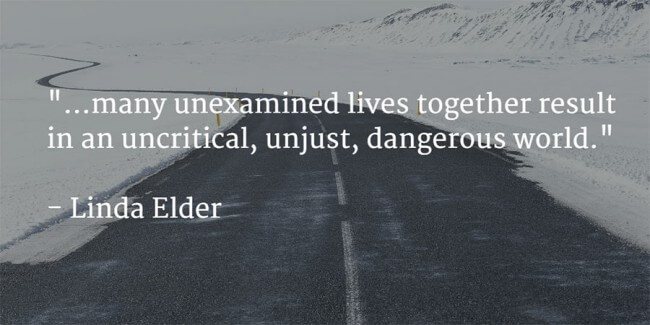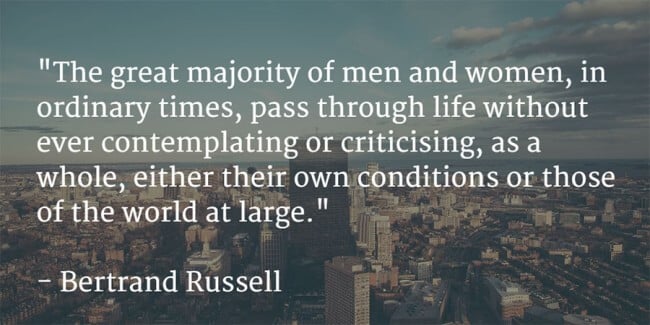Ways to Improve Your Critical Thinking Skills
I didn’t realize it at the time, but my teacher was giving a concise summary of critical thinking. My high school teachers gave similar speeches when describing what would be expected of us in college: it’s not about the facts you know, but rather about your ability to evaluate them.
And now that I’m in college, my professors often mention that the ability to think through and solve difficult problems matters more in the “real world” than specific content.
Despite hearing so much about critical thinking all these years, I realized that I still couldn’t give a concrete definition of it, and I certainly couldn’t explain how to do it. It seemed like something that my teachers just expected us to pick up in the course of our studies. While I venture that a lot of us did learn it, I prefer to approach learning deliberately, and so I decided to investigate critical thinking for myself.
What is it, how do we do it, why is it important, and how can we get better at it? This post is my attempt to answer those questions.
In addition to answering these questions, I’ll also offer seven ways that you can start thinking more critically today, both in and outside of class.
What Is Critical Thinking?
“Critical thinking is the intellectually disciplined process of actively and skillfully conceptualizing, applying, analyzing, synthesizing, and/or evaluating information gathered from, or generated by, observation, experience, reflection, reasoning, or communication, as a guide to belief and action.”
– The Foundation for Critical Thinking
The above definition from the Foundation for Critical Thinking website is pretty wordy, but critical thinking, in essence, is not that complex.
Critical thinking is just deliberately and systematically processing information so that you can make better decisions and generally understand things better. The above definition includes so many words because critical thinking requires you to apply diverse intellectual tools to diverse information.
Ways to critically think about information include:
Conceptualizing
Analyzing
Synthesizing
Evaluating
That information can come from sources such as:
Observation
Experience
Reflection
Reasoning
Communication
And all this is meant to guide:
Beliefs
Action
You can also define it this way:
Critical thinking is the opposite of regular, everyday thinking.
Moment to moment, most thinking happens automatically. When you think critically, you deliberately employ any of the above intellectual tools to reach more accurate conclusions than your brain automatically would (more on this in a bit).
This is what critical thinking is. But so what?
Why Does Critical Thinking Matter?
Most of our everyday thinking is uncritical.
If you think about it, this makes sense. If we had to think deliberately about every single action (such as breathing, for instance), we wouldn’t have any cognitive energy left for the important stuff like D&D. It’s good that much of our thinking is automatic.
We can run into problems, though, when we let our automatic mental processes govern important decisions. Without critical thinking, it’s easy for people to manipulate us and for all sorts of catastrophes to result. Anywhere that some form of fundamentalism led to tragedy (the Holocaust is a textbook example), critical thinking was sorely lacking.
Even day to day, it’s easy to get caught in pointless arguments or say stupid things just because you failed to stop and think deliberately.
But you’re reading College Info Geek, so I’m sure you’re interested to know why critical thinking matters in college.
Here’s why:
According to Andrew Roberts, author of The Thinking Student’s Guide to College, critical thinking matters in college because students often adopt the wrong attitude to thinking about difficult questions. These attitudes include:
Ignorant certainty. Ignorant certainty is the belief that there are definite, correct answers to all questions–all you have to do is find the right source (102). It’s understandable that a lot of students come into college thinking this way–it’s enough to get you through most of your high school coursework. In college and in life, however, the answers to most meaningful questions are rarely straightforward. To get anywhere in college classes (especially upper-level ones), you have to think critically about the material.
Naive relativism. Naive relativism is the belief that there is no truth and all arguments are equal (102-103). According to Roberts, this is often a view that students adopt once they learn the error of ignorant certainty. While it’s certainly a more “critical” approach than ignorant certainty, naive relativism is still inadequate since it misses the whole point of critical thinking: arriving at a more complete, “less wrong” answer. Part of thinking critically is evaluating the validity of arguments (yours and others’). Therefore, to think critically you must accept that some arguments are better (and that some are just plain awful).
Critical thinking also matters in college because:
It allows you to form your own opinions and engage with material beyond a superficial level. This is essential to crafting a great essay and having an intelligent discussion with your professors or classmates. Regurgitating what the textbook says won’t get you far.
It allows you to craft worthy arguments and back them up. If you plan to go on to graduate school or pursue a PhD., original, critical thought is crucial
It helps you evaluate your own work. This leads to better grades (who doesn’t want those?) and better habits of mind.
The value of critical thinking doesn’t stop with college, however. Once you get out into the real world, critical thinking matters even more. This is because:
It allows you to continue to develop intellectually after you graduate. Progress shouldn’t stop after graduation–you should keep learning as much as you can. When you encounter new information, knowing how to think critically will help you evaluate and use it.
It helps you make hard decisions. I’ve written before about how defining your values helps you make better decisions. Equally important in the decision-making process is the ability to think critically. Critical thinking allows you to compare the pros and cons of your available options, showing that you have more options than you might imagine.
People can and will manipulate you. At least, they will if you take everything at face value and allow others to think for you. Just look at ads for the latest fad diet or “miracle” drug–these rely on ignorance and false hope to get people to buy something that is at best useless and at worst harmful. When you evaluate information critically (especially information meant to sell something), you can avoid falling prey to unethical companies and people.
It makes you more employable (and better paid). The best employees not only know how to solve existing problems–but they also know how to come up with solutions to problems no one ever imagined. To get a great job after graduating, you need to be one of those employees, and critical thinking is the key ingredient to solving difficult, novel problems.


Comments
Post a Comment